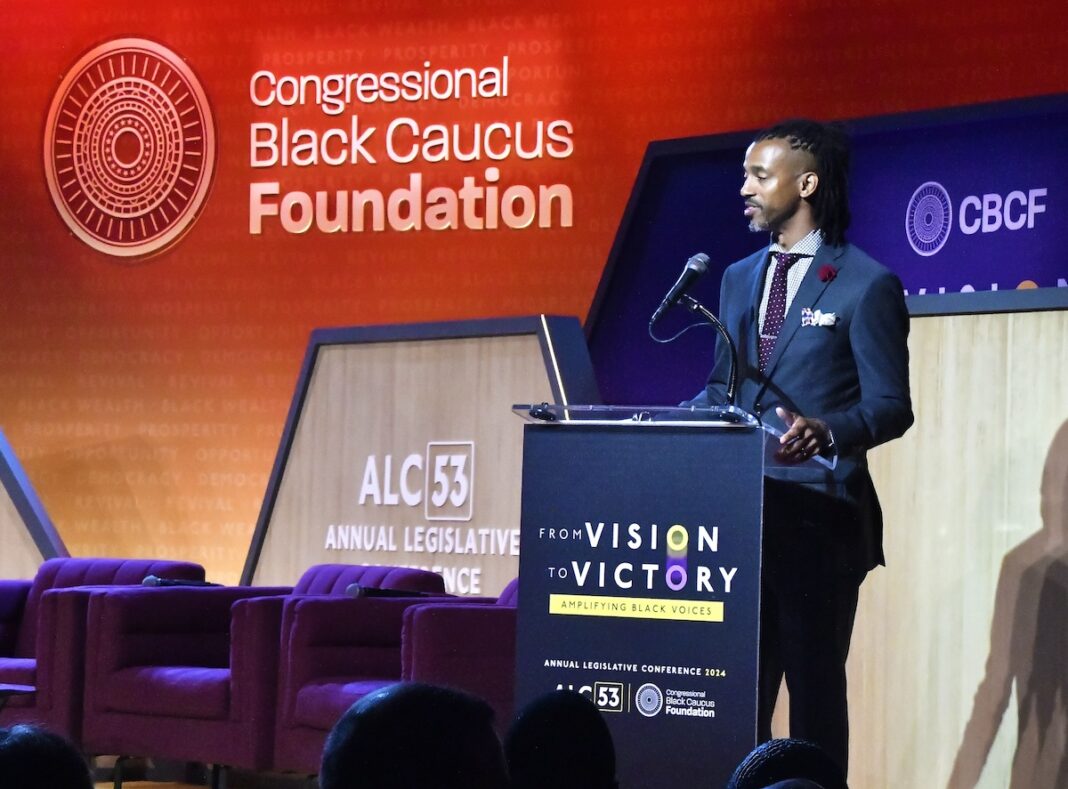Jonathan Cox firmly asserts that equity is not merely a political ideal but a fundamental necessity for the future of America. As the vice president of the Congressional Black Caucus Foundation (CBCF) Center for Policy Analysis and Research, he has been instrumental in framing a comprehensive roadmap entitled “Forward Together: The Black Policy Playbook for an Equitable America.” This significant document aims to dismantle systemic barriers and cultivate opportunities for Black communities nationwide.
Recently released ahead of the CBCF’s Annual Legislative Conference (ALC) scheduled for September 24-28 in Washington, D.C., the playbook outlines proactive strategies designed to close racial gaps in wealth, health, education, and justice. Furthermore, it emphasizes the crucial link between equity and the preservation of democracy itself.
The playbook revolves around seven principal policy areas: voting rights and civic engagement; economic opportunity and advancement; workforce development; education; health care; criminal legal system reform; and technology and telecommunications.

According to Cox, “An equitable America is one where structural and systemic barriers that produce racial disparities in all aspects of life such as wealth, health, education, and political power are removed.” He asserts that it’s imperative for federal, state, and local governments to make intentional investments in historically marginalized communities.
This investment means ensuring universal access to affordable health care, implementing fair housing practices, providing living-wage jobs, establishing strong worker protections, enabling access to voting, and formulating technology policies that guarantee broadband access while addressing algorithmic bias.
Cox underscores the importance of federal investments and tax policy as critical tools to bridge the racial wealth gap: “Lawmakers can make targeted federal investments and tax-policy changes that expand wealth- and asset-building opportunities for Black families.”
Specific recommendations for investing in Black communities include expanding the Child Tax Credit, fortifying the Low-Income Housing Tax Credit, and bolstering Community Development Financial Institutions alongside Minority Depository Institutions.
Pursuing health equity is another crucial area for Cox. He emphasizes that health equity for Black Americans is essential for overall quality of life and financial stability. His recommendations advocate for expanding Medicaid protections, investing in community health initiatives, scaling telehealth access, standardizing maternal care, and fostering culturally inclusive health services.
The playbook expands on educational reforms by calling for enhanced accountability in the Department of Education, particularly around programs like Title I and special education. “Lawmakers should protect and strengthen accountability,” Cox states, urging support for Historically Black Colleges and Universities (HBCUs) and improved K–12 funding, along with legislative actions aimed at countering curriculum censorship.
Criminal justice reform holds a prominent position within this policy framework. “Prioritize eliminating mandatory minimums, reform bail and pretrial detention, and establish independent police oversight,” he suggests, while underscoring the need for transparent policing data and the expansion of diversion and reentry programs. Aggressive expungement efforts for low-level offenses, particularly cannabis-related convictions, are also essential to revitalizing the impacted communities.
Cox points out that accountability must extend to the private sector as well. He believes that public-private partnerships, combined with accountability requirements, can facilitate greater equity. This includes tying federal infrastructure funding to equity benchmarks and mandating measurable commitments from suppliers regarding minority business inclusion and equitable hiring practices.
The playbook also articulates a vital connection between equity and the defense of democracy. Cox argues that safeguarding Black political power and civil rights necessitates a multi-faceted approach. Legislation like the Freedom to Vote Act and the John R. Lewis Voting Rights Advancement Act are both deemed essential for protecting voting access.
Additionally, Cox emphasizes the significant role of young leaders in the fight for justice and equity. “Young leaders play an integral role in pushing progressive policies and creating momentum for change,” he notes, highlighting their efforts in mobilizing voters and shaping public narratives, as well as engage in community-driven initiatives like digital access and restorative justice efforts.
The CBCF aims for the playbook to serve as both a roadmap and an accountability tool. Cox explains, “We provide policymakers with evidence-based research, policy assistance, and collaboration with the Playbook’s contributing organizations to spur legislative action and local change.”
The CBCF underlines the importance of the “Forward Together: The Black Policy Playbook for an Equitable America,” which is described as being “rooted in rigorous research and a deep understanding of longstanding disparities.” They emphasize that the playbook serves as a vital resource for advancing justice and opportunity for Black Americans.
With the ALC conference imminent, the stakes could not be clearer. “Equity is not optional, it is necessary for the success of our nation,” Cox articulates. “When Black Americans are supported and uplifted, the entire country benefits. That success requires concrete, measurable policy action across civic engagement, wealth-building, health equity, education, justice, workforce, and technology. The Playbook is a practical roadmap to facilitate this transition from rhetoric to enforceable policy, measurable targets, and sustained political momentum.”



